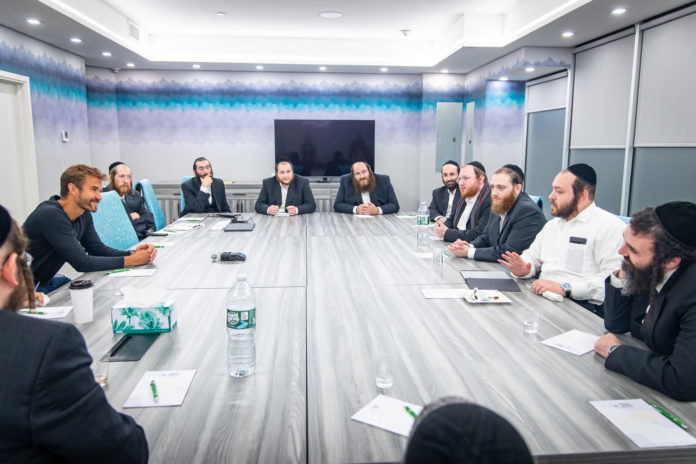In the span of a few days, I received several messages about Alex Judd and his company Path for Growth. Alex is a business coach based in Phoenix, Arizona, and he and his team have been hired by successful entrepreneurs in the Jewish community.
Then I received links to a post and a podcast where Alex talked about seven things he’s learned from the Orthodox Jewish community. When I saw that, I thought, “Now, that’s a genius way to garner Jewish clients.” But it turns out that Alex wrote that post after he already had many clients from our community. It wasn’t a gimmick.
I wanted to find out more about Alex and his methods. Most importantly, I wanted to pick up some practical tips for Ami readers.
No matter what industry you are in, there will be something here that you can implement. Enjoy!
—Nesanel
“I was born just south of Houston, Texas, in a place called Clear Lake. When NASA says, ‘Houston, we have a problem,’ they’re actually saying, ‘Clear Lake, we have a problem.’ My father, Brian Judd, was and still is an engineer at NASA. He’s worked in the space industry my entire life, and I’ve grown up around that program. My father doesn’t do as much engineering as he does leading and managing people, and he’s really good at that. He is one of the hardest workers I know.
“My mother was a teacher when I was growing up. She comes from a family of teachers. She has amazing enthusiasm and optimism, so she was an incredible, encouraging force in my life. I’ve always told people that when I’m at my best, I try to have the discipline of a NASA engineer and the enthusiasm of a grade school teacher—the best combination of my parents.
“Leadership was something that always interested me. My mother told me that when I was in the second grade, I said, ‘Mom, when I grow up, I don’t think I want to be a motivational speaker, but I would like to be a motivational teacher.’ She was thinking, What on earth? Who says that? She told me to go play outside or something. I think my passion for developing people and unleashing the best in others has always been there.
“I was always entrepreneurial, even as a kid. I think it was in middle school when my buddy and I would mow lawns. We made pretty good money, and we really enjoyed doing it. It was hard work in the heat of the summer in Texas, but we enjoyed hanging out and then buying things afterwards.
“In middle school and high school, I started to evaluate effective methods of communication. It sounds weird, but as a high schooler, I started finding and listening to motivational speakers. When my teachers would give a lesson, I began thinking to myself, I think I can present this material in a way that’s more engaging than they just did.
“I had some leadership positions when I was growing up. For example, I was the president of the student council in grade school, and I was also always the captain of the safety patrol. I loved people, and I still do. I’m convinced that people are the point. I was fascinated by the concept of leadership. I wanted to know why people listen to certain people more than others, and I was curious about what makes an effective leader.
“I had natural leadership qualities even as a kid, and I think my parents contributed to that in major ways. I would mobilize groups of 15 kids out in the cul-de-sac outside, and we would organize games and activities. Everyone would have his role. I would get everyone excited and emotionally invested, and make sure that everyone was seen. I didn’t know what I was doing at that time. We were just having fun. But I’ve learned that there are things you can do that make people feel like they’re a part of something. That’s always been a passion of mine. When a leader steps forward and says, ‘I created something that you can be a part of and here is where I think you’ll fit in,’ it’s just crazy to see how people react to that. Kids in elementary school responded to it, and so do my clients. Even big CEOs want to be part of something.
“I went to the University of Texas, where I majored in corporate communication and minored in business. I also went for political communication, thinking I might want to run for office one day, but after delving into the scene for a bit, I realized I had zero desire to ever do that.
“While in college, I was fortunate to have several internships. I wish I could say I had intentionality while working in these internships, but looking back, it was trial and error in seeing what I wanted to do for my career.
“I worked in the capital, at a startup, and in other companies. Today, there are many people who advocate against unpaid internships, but I think they’re wrong. My student internships were a real service to me. I got to rub shoulders with founders and leaders. There are so many leaders out there who are willing to teach you if you just ask. One of the characteristics that has helped me in my career is that I always asked a ton of questions. When I was an intern, I’d walk over to industry leaders and say, ‘I want to learn from you.’ I’d ask them for an hour of their time, and they’d inevitably ask me about myself, too.
“While at an internship, I learned many solid lessons, including about what not to do. I had the opportunity to see companies operate in ways that were not effective, and I was able to craft ideas and solutions for making them better, all while I was a freshman in college.
“For example, I saw what it meant to run a meeting poorly. I saw teams sit together with no plan and no direction, and how meetings like that ended with more confusion. I started thinking to myself: What would be an effective way to run a meeting? For example, having everyone take a few minutes to write down their goals for the meeting, defining clear roles, and stating one clear objective for the meeting is very effective.





















